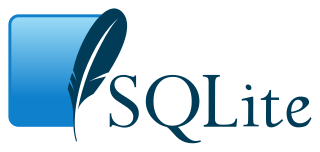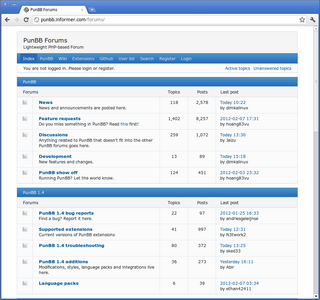Related Research Articles

PostgreSQL, also known as Postgres, is a free and open-source relational database management system (RDBMS) emphasizing extensibility and SQL compliance. It was originally named POSTGRES, referring to its origins as a successor to the Ingres database developed at the University of California, Berkeley. In 1996, the project was renamed to PostgreSQL to reflect its support for SQL. After a review in 2007, the development team decided to keep the name PostgreSQL and the alias Postgres.

SQLite is a relational database management system (RDBMS) contained in a C library. In contrast to many other database management systems, SQLite is not a client–server database engine. Rather, it is embedded into the end program.

Movable Type is a weblog publishing system developed by the company Six Apart. It was publicly announced on September 3, 2001; version 1.0 was publicly released on October 8, 2001. The current version is 7.0.
Clarion is a commercial, proprietary, fourth-generation programming language (4GL), multi-paradigm, programming language and integrated development environment (IDE) from SoftVelocity used to program database applications. It is compatible with indexed sequential access method (ISAM), Structured Query Language (SQL), and ActiveX Data Objects (ADO) data access methods, reads and writes several flat file desktop database formats including ASCII, comma-separated values (CSV), DOS (binary), FoxPro, Clipper, dBase, and some relational databases via ODBC, Microsoft SQL Server, Sybase SQL Anywhere, and Oracle Database through the use of accelerated native database drivers, and XML, Clarion can be used to output to HTML, XML, plain text, and Portable Document Format (PDF), among others.
GNOME-DB is a database application by the GNOME community. The project aims to provide a free unified data access architecture to the GNOME project for all Unix platforms. GNOME-DB is useful for any application that accesses persistent data, since it now contains a data management API.
The following tables compare general and technical information for a number of relational database management systems. Please see the individual products' articles for further information. Unless otherwise specified in footnotes, comparisons are based on the stable versions without any add-ons, extensions or external programs.
Kexi is a visual database applications creator tool by KDE, designed to fill the gap between spreadsheets and database solutions requiring more sophisticated development. Kexi can be used for designing and implementing databases, data inserting and processing, and performing queries. It is developed within the Calligra project but is released separately.
ADOdb is a database abstraction library for PHP, originally based on the same concept as Microsoft's ActiveX Data Objects. It allows developers to write applications in a consistent way regardless of the underlying database system storing the information. The advantage is that the database system can be changed without re-writing every call to it in the application.

LAMP is an acronym denoting one of the most common solution stacks for many of the web's most popular applications. However, LAMP now refers to a generic software stack model and its components are largely interchangeable.

Silverstripe CMS is a free and open source content management system (CMS) and framework for creating and maintaining websites and web applications. It provides an out of the box web-based administration panel that enables users to make modifications to parts of the website, which includes a WYSIWYG website editor. The core of the software is Silverstripe Framework, a PHP Web application framework.

SPIP is a free software content management system designed for web site publishing, oriented towards online collaborative editing.
phpCodeGenie is a code generator for web applications. Once the user designs their database tables, phpCodeGenie generates the scripts and programs. It will build data entry forms, insert scripts, database lister scripts, edit record forms, update record scripts, delete confirmation scripts, delete scripts, search forms, search scripts and other frontend/database interaction code.

Navicat is a series of graphical database management and development software produced by CyberTech Ltd. for MySQL, MariaDB, MongoDB, Oracle, SQLite, PostgreSQL and Microsoft SQL Server. It has an Explorer-like graphical user interface and supports multiple database connections for local and remote databases. Its design is made to meet the needs of a variety of audiences, from database administrators and programmers to various businesses/companies that serve clients and share information with partners.
Web2py is an open-source web application framework written in the Python programming language. Web2py allows web developers to program dynamic web content using Python. Web2py is designed to help reduce tedious web development tasks, such as developing web forms from scratch, although a web developer may build a form from scratch if required.
Hyper Text Structured Query Language (HTSQL) is a schema-driven URI-to-SQL query language that takes a request over HTTP, converts it to a SQL query, executes the query against a database, and returns the results in a format best suited for the user agent The HTSQL language is implemented on "HTSQL servers," which use HTSQL to convert web requests into equivalent SQL, executes requests on a server-side database, and returns results in XML, HTML, CSV, JSON, or YAML formats. The current implementation as of April 2010 uses Python and works with PostgreSQL, MySQL, SQLite, Oracle, and Microsoft SQL Server databases.

Scriptcase RAD is a development platform for PHP applications, is web oriented and can be installed in a server in the internet. It acts as a platform for developers and allows them the use of a graphical interface directly through a web browser to automatically generate the codes. It was developed by NetMake in the year 2000. Can be used on Mac, Windows, and Linux operating system.

PunBB (PunBulletinBoard) is a lightweight PHP-based internet discussion board system released under the GNU General Public License. The project's primary goal is to be a faster, smaller and less graphic alternative to discussion boards such as phpBB, Invision Power Board or vBulletin. Many open-source and commercial projects' discussion boards use PunBB. Until September 2011, Facebook's Developers were using Facebook Developer's Forum for discussions and bug reports, which was powered by PunBB.

Fat-Free Framework is an open-source web framework distributed under the GNU General Public License and hosted by GitHub and Sourceforge. The software seeks to combine a full featureset with a lightweight code base while being easy to learn, use and extend.
The following outline is provided as an overview of and topical guide to MySQL:

DBeaver is a SQL client software application and a database administration tool. For relational databases it uses the JDBC application programming interface (API) to interact with databases via a JDBC driver. For other databases (NoSQL) it uses proprietary database drivers. It provides an editor that supports code completion and syntax highlighting. It provides a plug-in architecture that allows users to modify much of the application's behavior to provide database-specific functionality or features that are database-independent. This is a desktop application written in Java and based on Eclipse platform.
References
- ↑ "What is a Low-Code Development Platform? Discover the basics of Low-Code development with DaDaBIK".
- ↑ http://www.dadabik.org/dadabik_license.txt
- ↑ see harwoodr Github repository
- ↑ "DaDaBIK Blog - DaDaBIK 9 Monterosso is here".
- ↑ https://www.youtube.com/watch?v=d4h3Dui46B8
- ↑ "License - DaDaBIK".
- ↑ "DaDaBIK Blog - 18 years of low-coding / No-coding with DaDaBIK - DaDaBIK 10 "Manarola" is here".
- ↑ https://www.youtube.com/watch?v=oIoEgCygmi0
- ↑ "DaDaBIK Blog - DaDaBIK 11 Elba is here: Live edit, import/Synch from MS Excel and more".
- ↑ https://www.youtube.com/watch?v=nwsVaraF6DE
- ↑ PHP database front-end / CRUD generator for MySQL SQLite PostgreSQL - Create a PHP online database application / data entry application without coding - DaDaBIK is a DataBase ...
- ↑ Google Scholar - DaDaBIK
- ↑ World Oral Literature Project : Research & Outreach
- ↑ Disappearing Languages Arrested Online Archived 2011-03-07 at the Wayback Machine
- ↑ European Centre for Media Literacy - Services - Content repository Archived 2013-12-14 at the Wayback Machine
- ↑ Yale Center for International and area studies - working papers database Archived 2003-02-19 at the Wayback Machine
- ↑ Capterra - Database software - DaDaBIK
- ↑ Hotscripts ... - Database Tools - DaDaBIK
- ↑ PHP database front-end / CRUD generator for MySQL SQLite PostgreSQL - Create a PHP online database application / data entry application without coding - DaDaBIK is a DataBase ...